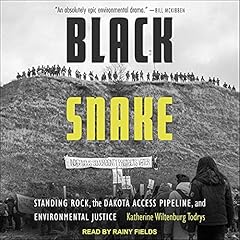
Our History Is the Future
Standing Rock Versus the Dakota Access Pipeline, and the Long Tradition of Indigenous Resistance
Failed to add items
Add to Cart failed.
Add to Wish List failed.
Remove from wishlist failed.
Adding to library failed
Follow podcast failed
Unfollow podcast failed
Get 3 months for $0.99/mo
 Prime members: New to Audible? Get 2 free audiobooks during trial.
Prime members: New to Audible? Get 2 free audiobooks during trial.
Buy for $20.56
-
Narrated by:
-
Bill Andrew Quinn
-
By:
-
Nick Estes
How two centuries of Indigenous resistance created the movement proclaiming "Water is life".
In 2016, a small protest encampment at the Standing Rock Reservation in North Dakota, initially established to block construction of the Dakota Access oil pipeline, grew to be the largest Indigenous protest movement in the 21st century. Water Protectors knew this battle for native sovereignty had already been fought many times before, and that, even after the encampment was gone, their anti-colonial struggle would continue. In Our History Is the Future, Nick Estes traces traditions of Indigenous resistance that led to the #NoDAPL movement. Our History Is the Future is at once a work of history, a manifesto, and an intergenerational story of resistance.
©2019 Nick Estes (P)2019 TantorListeners also enjoyed...




















People who viewed this also viewed...








great listen
Something went wrong. Please try again in a few minutes.
#Landback
Something went wrong. Please try again in a few minutes.
Excellent read
Something went wrong. Please try again in a few minutes.
Excellent review of Native resistance
Something went wrong. Please try again in a few minutes.
This is a must read for anyone trying to be about that anti settler colonial life.
Rules for Indigenous Radicals
Something went wrong. Please try again in a few minutes.


